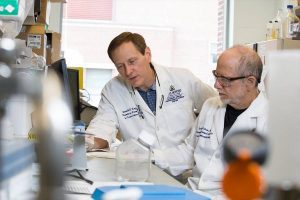To Achieve 100% Job Placement, This Program Teaches Beyond the Classroom
How The Program Director of the Bioprocessing Technology A.A.S Program at Frederick Community College Ensures That All of Her Students Land Jobs

August 22, 2018
If you spend any time around the water cooler, you’ll undoubtedly hear conversations about the challenges that so many Biotech companies face in finding and hiring good workers. However, there are ten (10) companies in Frederick where you will hear a different story altogether. Their latest round of new hires came onboard with all of the right lab skills, soft skills, and industry experience to be successful.
All Eighteen (18) graduates from Frederick Community College’s Bioprocessing Technology A.A.S. Degree program had more than just diplomas in their hands at graduation this year; they had job offers.
The Bioprocessing Technology A.A.S. Degree Program at Frederick Community College stands out as one of the best industry-oriented two-year programs in the region. However, it’s much more than just an industry relevant curriculum that makes it stand out. The secret weapon is Dr. Judy Staveley, Ph.D., Program Director and Assistant Professor, who has figured out what it takes to help her students land jobs.
“The mission we have at FCC is, “let’s get these kids into jobs.” Why get a degree if you can’t get the job?” – Dr. Judy Staveley
Dr. Judy took over the program two years ago and under her leadership, the program is not only attracting much more students, but it’s getting the college more attention from the local biotech industry as well. For example, a local Frederick biotech company, VaLogic LLC, is now working more closely with the college and is one of the companies that is building them a bigger tissue culture lab to accommodate the growth of the program.
Bringing industry into the classroom, and students into the industry
The BioProcessing Technology program has an emphasis on R&D and applied research. The curriculum is based on the input from an advisory board of biotech industry professionals that Dr. Judy has helped to bring together. The board recommends what is needed in the industry that students need to know when they graduate; including what cell lines to use, techniques, processes, working conditions and the soft skills.
Dr. Staveley has been very creative with how she has implemented the program and her board’s recommendations. She implemented a cohort model, adjusted the times they offer their classes, and is even using online courses for some of the curricula so students can spend more time in the lab to get the hands-on learning.
“What’s really marketable for the student when they leave the program is the bioprocessing & biotech environment class & the tissue culture class.” Dr. Judy shared. “These are the last two classes before graduation and are heavy in R&D and manufacturing with a strong industry focus. They require students to follow GMP and GLP regulations, aseptic techniques, and they sometimes even have to wear the bunny suites in the lab to prepare for pharma manufacturing jobs.”

Aside from the industry-like conditions in the classroom, Dr. Judy takes her students on field trips to get the real-world exposure and environment to the biotech industry. Students get to see the type of work they could do and the environments they would work in. This past year they went to the FDA, which was an eye-opening experience for many of her students. She also spends a whole day at AstraZeneca where her students practice gowning up in full suits and learning directly from AstraZeneca what a job is like in their company. In addition, they learned from HR how to come prepared for an interview and what other expectations are required of them after graduation. She credits Joe Sanchez, Ph.D. in Frederick, MD and Mike Waddington in Gaithersburg, MD at MedImmune/AstraZeneca for helping to make these experiential learning days happen.

Staying connected to HR is another important part of the equation for Dr. Judy. She takes the time to reach out to HR to follow up on her students, but also to learn more about what HR wants from the students in the program. One HR manager told her a story about a guy they hired and spent weeks training, only to find out that he didn’t want to wear a surgical mask and ended up quitting. It was a huge waste of time and money for the company. After hearing that Dr. Judy implemented a new rule that her students have to wear a mask in the lab, even if the experiment didn’t require it. She wants to ensure her students are learning how to work with the same expectations they will have in the real world.
These close industry relationships really help when it comes to internships, which is a non-negotiable requirement for her students because the hands-on, industry experience is so beneficial to their success. Dr. Judy is very engaged in this whole process too. Not only does she use her network to connect students with employers, but she takes it a step further and helps the employers to identify and take advantage of grant programs, like from Frederick Workforce Development, that will help to pay for the cost of the internship. Her approach eliminates the common barriers in the internship process and makes it easy for employers to say ‘yes’ to working with her students.
Teaching beyond the classroom
Teaching what matters in the real world is another part of Dr. Judy’s secret recipe. There are many other important aspects to a scientific career outside of the lab skills and knowledge learned in a classroom. These other important career skills include networking, leadership development, earning credentials and publicizing your research. Like it or not, these things all matter in the real world and Dr. Judy makes sure that her students are well prepared.
Not only will students take two years of challenging classes, but she also gets her students involved in the Biotech club. This is an extracurricular program where her students will take leadership positions in running the club. This has even led some students to pursue positions in the Student Government Association at the college. This helps her students learn about leadership, teamwork, and communication that a lot of employers like. After hiring two of her students, VaLogic LLC said that being Presidents of her club made the students responsible and helped them grow up.
Very few community college students have an opportunity to get published, so Dr. Judy has also made that an important component of her model. She encourages them to do the research and then present it, and publish it.
In fact, by the time a student has graduated, they will have presented and published their research at least three times. They continue to expand on their research every semester, so each time they present or publish it will have different titles, and improve over the last time. “By the third time they are presenting their work they have really learned a lot and it really shows”, Dr. Judy proudly reflected this process. “This process helps students continue to hone the skills that employers want; like writing, presenting and clearly articulating your work.”
 One place they will publish is in the FCC and the Biotech Club Journal called “The Incubator”, which started this past year so students could highlight the abstracts from their research projects that they do during their internships. It’s great for students and also for the companies that hired them who also get extra exposure. Students are now also uploading their research and posters to ResearchGate to build their online scholarly profiles.
One place they will publish is in the FCC and the Biotech Club Journal called “The Incubator”, which started this past year so students could highlight the abstracts from their research projects that they do during their internships. It’s great for students and also for the companies that hired them who also get extra exposure. Students are now also uploading their research and posters to ResearchGate to build their online scholarly profiles.
Each student is also encouraged to join Sigma Xi, the Scientific Research Honor Society, and submit an independent research project to compete for a national research competition. Once they submit their project and it’s accepted, they get to graduate with their Honors Cords, which is a big deal for many of them, and another perk for their resume. Likewise, she also emphasizes the importance to take part in the honors program at FCC. Students need a 3.3 to qualify and are required to present their research project against their peers at the honors program forum. After doing so they get recognized for their work and then get additional recognition for graduating with honors.
This approach to immersive learning and experiential teaching gives students so much more than just knowing they are required to graduate with. Her students graduate with the knowledge, skills, credentials and the experiences that give them the confidence to enter the workforce and be productive for any employer in their field.
Where are they Now?
Her eighteen students are now gainfully employed at the below employers, many of whom were also where they interned.
- VaLogic LLC – 3
- Texcell – 2
- Fort Detrick – 2
- Thermo Fisher Scientific – 2
- LONZA – 2
- GSK – 2
- Precision for Medicine – 1
- AstraZeneca – 1
- Johns Hopkins – 1
- Integrated Pharma Services – 1
- KempBio – 1
What’s your Favorite Success Story?
Dr. Judy reflected on one of her students, Godfrey, who has been with Judy since the beginning as one of her first students. He came from Africa and joined the program in her first year. He was part of the NSF innovation challenge that they won a national award for in 2017. This got them recognition and a visit to Capitol Hill and the White House. Now Godfrey has moved on to UMUC to pursue an M.S. degree. He started as Lab tech through an internship at Johns Hopkins, and now he is a lab manager there and an Adjunct Professor at FCC. In fact, he and Dr. Judy still continue to do research together on the side.
Who is Dr. Judy Staveley?
Dr. Judy Stavely, Ph.D. has been an Assistant Professor at FCC since 2007, and the Program Director since 2016. She been with Sigma Xi, the Scientific Research Honor Society, for 11 years, and is an officer and President. She’s also President-Elect for the Washington Academy of Sciences. These leadership positions and the networking she does has perks, and her students benefit. She loves to stay busy and loves being involved in these groups and communities. “If the community sticks together, everyone succeeds.” Dr. Judy shared as one of her underlying principles.
Originally, Dr. Judy wanted to be a Doctor and even did a year of clinical at Hopkins before she realized that wasn’t her calling. She was teaching before she did her residency and loved it. She enjoys giving back and inspiring students to pursue academic and personal excellence, and realized that it was her destiny. “Everything that I do is about the students and I’m not going to give up on them” she shared. “That’s what I’m here for and that’s my mission – my journey is to help others follow my pathway to discover theirs.”
The advice she gives her students is, “Don’t give up”. Continue your education and get out of the classroom to get the experience. Experience is what everyone wants. Students often have a hard time seeing the big picture, but Dr. Judy does a great job at showing them that there is so much opportunity out there and paths they can take once they get their foot in the door and begin to move up the ladder.
Dr. Judy is also CEO of The Platform Magazine and an avid social media evangelist. So she not only knows how to teach the science, but she knows a thing or two about marketing and personal branding; which is an important skill to teach in this new digital world. She mentions that promoting her FCC student’s success is a must and they deserve to shine. She’s is very proud of what they have accomplished.
Team #Biotech Frederick Community College takes a tour of VaLogic LLC Biotech headquarters. Thanks to our amazing advisory board members CEO Bill Robertson and Jeff Wells for hosting us! #education @FrederickCC @VaLogic_Inc pic.twitter.com/rPgO0KFH7v
— Dr. Judy Staveley ™ 🔬 (@DrJudyStaveley) August 21, 2018
It’s rewarding for her when she hears that her students have stable, secure jobs that are providing for their families. “I’m blessed and have been successful so it makes me very happy to see my students succeed and to be in a safe, happy place after graduation.”
The third year of the FCC Bioprocessing Technology A.A.S. Degree Program is about to begin this Fall and there is still time to enroll to get your career started with the help of someone who has figured out the science behind getting her graduates jobs.
- About the Author
- Latest Posts
BioBuzz is a community led, experience focused, biotech and life sciences media and events company. BioBuzz highlights regional breaking news, industry professionals, jobs, events, and resources for business and career growth. Their weekly newsletter is subscribed to by thousands in the BioHealth Capital Region and Greater Philadelphia as the go-to for industry updates.




